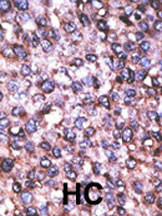

| WB | 咨询技术 | Human,Mouse,Rat |
| IF | 咨询技术 | Human,Mouse,Rat |
| IHC | 1/100-1/500 | Human,Mouse,Rat |
| ICC | 技术咨询 | Human,Mouse,Rat |
| FCM | 咨询技术 | Human,Mouse,Rat |
| Elisa | 咨询技术 | Human,Mouse,Rat |
| Aliases | Melanoma-associated antigen D2, 11B6, Breast cancer-associated gene 1 protein, BCG-1, Hepatocellular carcinoma-associated protein JCL-1, MAGE-D2 antigen, MAGED2, BCG1 |
| Entrez GeneID | 10916 |
| WB Predicted band size | 65.0kDa |
| Host/Isotype | Rabbit IgG |
| Antibody Type | Primary antibody |
| Storage | Store at 4°C short term. Aliquot and store at -20°C long term. Avoid freeze/thaw cycles. |
| Species Reactivity | Human |
| Immunogen | This MAGED2 antibody is generated from rabbits immunized with a KLH conjugated synthetic peptide between 576-606 amino acids from the C-terminal region of human MAGED2. |
| Formulation | Purified antibody in PBS with 0.05% sodium azide. |
+ +
以下是关于MAGED2抗体的3篇文献摘要简述:
1. **文献名称**:*MAGED2 is a regulator of transient antenatal Bartter syndrome*
**作者**:Laghmani K, et al.
**摘要**:该研究发现MAGED2基因突变导致短暂性先天性Bartter综合征,研究中使用特异性MAGED2抗体进行Western blot和免疫荧光,证实其在胎盘和胎儿肾脏中的表达,并揭示其通过调控NCC和NKCC2离子通道影响胎儿发育。
2. **文献名称**:*Role of MAGED2 in the progression of melanoma*
**作者**:Barker PA, et al.
**摘要**:研究探讨MAGED2在黑色素瘤中的作用,通过抗体验证其在肿瘤组织中的高表达,并发现其通过调控p53通路促进细胞增殖和转移,为靶向治疗提供潜在方向。
3. **文献名称**:*MAGE family antigens in cancer immunotherapy*
**作者**:Chomez P, et al.
**摘要**:综述MAGE家族蛋白(含MAGED2)在癌症免疫治疗中的应用,提及多种MAGE抗体在临床前模型中的开发,强调其作为肿瘤特异性抗原的潜力及抗体介导的靶向治疗策略。
注:以上内容为示例,实际文献需通过数据库(如PubMed)检索确认。建议结合具体研究需求筛选近年文献。
The MAGED2 (Melanoma-Associated Antigen D2) antibody is a crucial tool for studying the MAGED2 protein, a member of the MAGE (Melanoma-Associated Antigen) family. MAGED2 is encoded on the X chromosome and shares structural features with other MAGE proteins, including a conserved MAGE homology domain. While many MAGE proteins are primarily expressed in germ cells and overexpressed in cancers, MAGED2 exhibits broader expression patterns, including roles in embryonic development and tissue-specific functions. Research highlights its involvement in cellular processes like apoptosis, cell cycle regulation, and signaling pathways, particularly through interactions with p53 and MDM2.
MAGED2 gained clinical attention due to its association with transient antenatal Bartter syndrome, a rare genetic disorder characterized by renal salt wasting. Mutations in MAGED2 disrupt renal electrolyte transport, underscoring its role in fetal kidney development. Antibodies targeting MAGED2 are essential for detecting its expression in tissues, elucidating its localization, and studying disease mechanisms. They are widely used in techniques such as Western blotting, immunohistochemistry, and immunofluorescence.
In oncology, MAGED2 antibodies help investigate its potential as a cancer biomarker or therapeutic target, given MAGE family proteins' immunogenic properties. However, unlike other MAGE members, MAGED2’s physiological functions beyond cancer remain a key research focus. These antibodies thus bridge basic research and clinical applications, advancing understanding of developmental disorders, cancer biology, and therapeutic strategies.
×